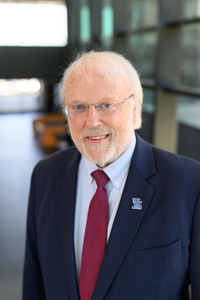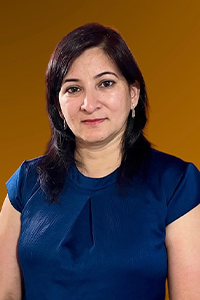Redox Metabolism Shared Resource Facility (RM SRF)
RM SRF Overview
The mission of the Redox Metabolism Shared Resource Facility (RM SRF) is to provide expertise and services in redox metabolism, oxidative stress, mitochondrial function, proteomics, and metabolomics to basic and clinical investigators of the Markey Cancer Center (MCC) doing basic, pre-clinical, and clinical research.
Cancer cells demonstrate increased free radical biology and altered metabolism. Often these changes are manifested by elevated markers of oxidative stress, modified mitochondrial and cellular metabolism, and since proteins carry out metabolic processes, by differential protein expression and/or posttranslational modification. Among the latter are specific oxidative and epigenetic modifications.
Specific Aims
- Analysis of biomarkers of oxidative and nitrosative stress.
- Measurement of redox state/redox signaling and mitochondrial functions.
- Metabolomic services (i.e., profiling and stable isotope resolved metabolomics).
- Proteomic services.
RESEARCH
|
Did you acknowledge
the RM SRF?

The RM SRF offers the investigation of the integrated aspects of redox metabolism using four major services. To request any of the following services, please see the How to Request Services tab.
Service 1: Analysis of markers of oxidative and nitrosative stress.
- Indices of protein oxidation (protein carbonyls and 3-nitrotyrosine).
- Index of lipid peroxidation (protein-bound 4-hydroxy-2-trans-nonenal, HNE).
- Index of DNA or RNA oxidation (8-hydroxy-2 deoxy-guanosine or 8-hydroxy-2-guanosine, respectively).
- Analyses of antioxidant enzyme activities and levels.
- Analyses of reduced and oxidized glutathione (GSH/GSSG) and NAD+/NADH, NADP+/NADPH.
- Interpretation of results and suggestions for use of these indices in the three MCC Research Programs
Service 2: Molecular biological manipulation of biological systems with which to investigate redox signals, including measurements of mitochondrial function
- Seahorse analyses to monitor changes in oxygen consumption and pH in intact cells simultaneously using a microtiter plate platform (for example, to facilitate dose-response studies of chemotherapeutics).
- Seahorse analysis of fatty acid oxidation.
Service 3: Proteomics identification of proteins. Proteomics or redox proteomics analyses of protein expression or oxidatively or covalently modified proteins
- Proteomics identification of proteins with differential expression, deferential oxidative modification or differential covalent modification in systems of interest: protein separation, digestion, and Nano LC-MS/MS sequence analysis of tryptic peptides on an orbitrap MS/MS instrument.
- Protein digestion.
- Database interrogation to identify proteins.
- Validation of identification by Western blotting or other means.
- Functional analysis of oxidatively modified proteins (can also be performed for other post-translational modifications).
- Analysis of protein-protein interactions involved in redox signaling (can also be applied to other signaling pathways).
- Interpretation of results in terms of pathways and functions modulated by protein oxidation.
Service 4: A) Metabolomics and RPPA proteomics (through CESB). Two broad categories of services are performed.
- Profiling refers to targeted or untargeted experimental designs to determine the amounts of features in analytical platforms (e.g. different types of MS or NMR) or the identities and amounts of compounds in samples.
- Stable Isotope Resolved Metabolomics (SIRM). SIRM enables simultaneous quantitative analysis of many metabolic "pathways" and fluxes that are of special relevance in the context of metabolic reprogramming that occurs in cancer, including energy production, anabolic pathways necessary for proliferation, and survival pathways including oxidative stress metabolism.
A detailed list of metabolomics services and rates can be found here.
How the RM SRF furthers Markey science.
Ancillary Services (Gratis)
In addition, the RM SRF offers the following ancillary services:
- Consultation for assessment of services, design and interpretation of experiments involving oxidative stress and Seahorse XFe analyses, directing investigators to proteomics or metabolomics components of RM SRF as needed.
- Education of MCC investigators on ways to prevent artifactual results and, consequently, obtain reliable and precise data.
- As needed, writing technical descriptions, result sections and discussion paragraphs for posters, papers and grants. Assistance to investigators on grant proposals and manuscripts by providing technical information or preliminary data.
- Provision of templates for protocols of indices of oxidative stress, Seahorse technology, proteomics and metabolomics.
- Pursuit of new applications of expression and redox proteomics to identify other protein post-translational modifications at the cancer interface (e.g., methylation, acetylation).
The RM SRF now uses the online program iLab to manage all service requests and billing except for metabolomics and RPPA which are billed through the CESB system. To request any RM SRF services, visit the iLab landing page with more detailed instructions, including a one-time account setup. For questions or help in setting up your iLab account, or to schedule a consultation, please contact Dr. Savita Sharma.
- If Service 1 or Service 2 is needed, Dr. Sharma will direct you to the RM SRF facility at 335, Combs Cancer Research Building.
- If you are interested in Service 3 (proteomics), Dr. Sharma will direct you to the Office of the Vice President for Research's resident Proteomics Core.
- If you are interested in Service 4 (metabolomics), Dr. Sharma will direct you to Dr. Rick Higashi.
Prior to contacting Dr. Higashi for metabolomics services, investigators should begin preparing to discuss questions such as: what is the problem; what is the experimental system and why; what information is already available; and whether Seahorse analyses are appropriate to conduct. Once a researcher has answers to these questions, they should contact one of the three Center for Environmental and Systems Biochemistry (CESB) directors listed below to begin consultation. Like all components of the RM SRF, the metabolomics component operates on a charge-back basis. It is very common for data analysis to take 90% of metabolomics labor, so MCC researchers should be prepared to discuss the time frame and cost structure with this consideration.
- Dr. Rick Higashi (rick.higashi@uky.edu), Associate Director, Metabolomics Component of RM SRF and Director of RC-SIRM
- Dr. Teresa Fan (twmfan@gmail.com), CESB Director
- Dr. Andrew Lane (andrew.lane@uky.edu), CESB NMR Director
Visit the CESB website for additional information.
Redox Metabolism Shared Resource Facility (RM SRF)
Combs Cancer Research Building, Room 335-334
744 Rose St., Lexington KY 40536-0293
859-232-1106
The RM SRF can be contacted online any time, 24 hours a day, via iLab.
Service 1: Assays of total protein oxidation and lipid peroxidation.
- $80/per oxidative modification/per membrane used
Service 2: Seahorse 96 well analysis rate $198/sample plate
- Seahorse 8 well analysis rate $99/sample plate
- Molecular biological manipulation of redox signaling rate $100/unit
- Assay of redox enzymes rate $100/unit
Service 3: A detailed list of proteomics services and rates can be found on the CESB website.
Service 4: Metabolomics through CESB/TEC Biosciences
- A detailed list of metabolomics rates can be found on the CESB website.
Note: MCC subsidizes services 1 and 2 for MCC members at a rate of 50%; service 3 at the rate of 40%.
Service 1. Analysis of markers of oxidative and nitrosative stress
What is the most reliable assay to detect oxidative stress in vitro?
The selection of the best marker will depend on the aim of the study, marker of interest, and sample type.
How do we like to receive samples?
We usually prefer to receive cell/tissue lysates that are freshly isolated and stored in cold conditions or -80°C frozen to prevent degradation.
Service 2. Seahorse XFe-based analyses of mitochondrial function and glycolysis
How to bring samples for analysis?
A sample plate for cell seeding can be collected from RM SRF prior to setting up the experiment which is compatible with the Seahorse machine.
Where to fill in details for the Seahorse experiment?
Wave software is available free online at the Agilent site and can be downloaded to fill out the experimental details and could send as an email attachment prior to the day of the experiment.
How late cancellation of the booking for the Seahorse experiment could be done?
Seahorse experiment requires cartridge assembly hydration overnight before the experiment. So, cancellation should be done before noon prior to the day of booking.
Service 3. Proteomics
A detailed list of questions can be found in Services Tab on the CESB website.
Service 4. Metabolomics
A detailed list of questions can be found in Services Tab on the CESB website.

Acknowledge the RM SRF
Investigators are required to acknowledge the Markey Cancer Center Redox Metabolism Shared Resource Facility (RM SRF) in any publications that result from the use of RM SRF or information received through the MCC RM SRF. Please use the following statement to acknowledge the RM SRF.
“This research was supported by the Redox Metabolism Shared Resource Facility of the University of Kentucky Markey Cancer Center (P30CA177558).”






